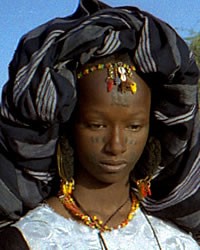Fulani, Central-Eastern in Niger

Photo Source:
Dan Lundberg - Flickr
Creative Commons
|
Send Joshua Project a map of this people group.
|
| People Name: | Fulani, Central-Eastern |
| Country: | Niger |
| 10/40 Window: | Yes |
| Population: | 834,000 |
| World Population: | 867,000 |
| Primary Language: | Fulfulde, Central-Eastern Niger |
| Primary Religion: | Islam |
| Christian Adherents: | 0.10 % |
| Evangelicals: | 0.00 % |
| Scripture: | New Testament |
| Ministry Resources: | Yes |
| Jesus Film: | No |
| Audio Recordings: | Yes |
| People Cluster: | Fulani / Fulbe |
| Affinity Bloc: | Sub-Saharan Peoples |
| Progress Level: |
|
Introduction / History
Some believe that the Fulani emigrated from the Middle East or northern Africa years ago in search of new grazing land for their cattle. Today, the Fulani occupy many parts of central and western Africa. They are grouped according to location, occupation and dialect. Some of the Fulani travel with their herds, others are settled, and some mix herding with farming.
Since all Fulani speak a Fulfulde dialect, this suggests that they adopted the language of the people they once conquered and continue to dominate, the Hausa of northern Nigeria. The Fulani are grouped and named according to their location, occupation and dialect of their widely spoken language. Accordingly, there are five major groups of Fulani: the Fula Toro, Fulakunda, Fulfulde, Fuuta Jalon, and Tukolor. The Central-Eastern Fulani in Niger are a subgroup of the greater Fulani tribe. They live on the border of Niger and Nigeria.
What Are Their Lives Like?
The Central-Eastern Fulani are expected to follow a code of high moral behavior known as Pulaaku. Pulaaku extols virtues such as kindness, bravery, patience, tolerance, perseverance, honesty, diligence, generosity, and dignity. To be reserved is part of being dignified; thus, they are shy and modest in public.
What Are Their Beliefs?
The Central-Eastern Fulani believe that to be a Fulani is to be a Muslim. Many Central-Eastern Fulani are revered teachers of Islam, who get much respect for their Islamic pedigree. They still practice pre-Islamic rituals which would be frowned upon by more orthodox Muslims. They believe Allah is too distant to help them with their daily needs.
What Are Their Needs?
Polluted water is a problem for the Central-Eastern Fulani, who suffer from malaria and other water-carried diseases. Missionaries and engineers might be welcomed in their efforts to make water potable in overpopulated cities. Because many Central-Eastern Fulani are among the ruling class, they would be in a position to influence their constituency to consider the claims of Christ.
Prayer Points
2 Timothy 2:21 says, "Therefore, if anyone cleanses himself from what is dishonorable, he will be a vessel for honorable use, set apart as holy, useful to the master of the house, ready for every good work." (ESV) Pray that the Sokoto Fulani would become "useful" to the one true holy God.
Pray that this would be the decade when the Central-Eastern Fulani have an unstoppable movement to Christ.
Pray for the Lord to thrust out loving workers to the Central Eastern Fulani people.